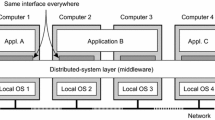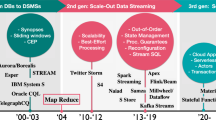Abstract
In the past decade, the booming of Internet challenges the middleware in three aspects: quality of service, balance of changes and stabilization, and across-Internet integration. This paper presents our work on distributed object computing middleware technology for these challenges, as well as the research and development on StarBus+, which is a CORBA standard-compliant middleware suite with the features such as object request broker supporting multi-* quality of service, component model, and integration with Web Service. This paper comprehensively presents the design and characteristics of StarBus+, and demonstrates how StarBus+ is enhanced to address the challenges of Internet computing through three case studies: inter-enterprise integration over Internet, application evolution through dynamic reconfiguration, and great massive information system building. The paper also suggests some research directions which are important for Internet computing.
Similar content being viewed by others
References
Andrew S Tanenbaum. Distributed Operating Systems. Prentice Hall, 1995.
Wang H M. Middleware in Internet age. 2002 Euro-China Co-Operation Forum on the Information Society, April 16–20, 2002, Beijing, P.R. China.
David E Bakken. Middleware. Encyclopedia of Distributed Computing, Urban J, Dasgupta P (eds.), Kluwer Academic Publishers, 2001.
Richard E Schantz, Douglas C Schmidt. Middleware for distributed systems: Evolving the common structure for network-centric applications. Encyclopedia of Software Engineering, John Wiley & Sons, 2001.
Hennadiy Pinus. Middleware: Past and present a comparison. http://www.st.informatik.tu-darmstadt.de/database/se-min-ars/data/middleware.pdf?id=79
Fan G C, Zhong H, Huang T, Feng Y L. A survey on Web application servers. Journal of Software, 2003, 14(10): 1728–1739. (in Chinese)
Papazoglou M P, Georgakopou-los D. Service-oriented computing. Communication of the ACM, 46(10): 25–28.
Nahrstedt K, Xu D, Wichadakul D, Li B. QoS-aware middleware for ubiquitous and heterogeneous environments. IEEE Communications Magazine, 2001, 39(11): 140–148.
Baochun Li, Dongyan Xu, Klara Nahrstedt. Towards integrated runtime solutions in QoS-aware middleware. In Proc. ACM Multimedia Middleware Workshop (M3W 2001), Ottawa, Canada, October 5, 2001, pp.11–14.
Blair G, Coulson G, Grace P. Research directions in reflective middleware: The lancaster experience. In Proc. 3rd Workshop on Reflective and Adaptive Middleware (RM2004), October 18th 2004, pp.262–268.
Gul A Agha. Adaptive middleware. Communications of the ACM, June 2002, 45(6): 31–32.
Almeida J P A, Wegdam M, van Sinderen M, Nieuwenhuis L. Transparent dynamic reconfiguration for CORBA. Symposium on Distributed Objects and Applications (DOA'01). Rome, Italy, September 2001, pp.197–207.
Maarten Wegdam. Dynamic reconfiguration and load distribution in component middleware [Dissertation]. University of Twente, Department of Computer Science, ISBN 90-75176-36-8, June 2003.
Gannod G C, Zhu H M, Mudiam S V. On-the-fly wrapping of Web services to support dynamic integration. In Proc. 10th Working Conference on Reverse Engineering (WCRE 2003), Nov. 13–16, 2003, 14: pp.175–184.
Yan Huang, David W Walker. Extensions to Web service techniques for integrating Jini into a service-oriented architecture for the grid. In Computational Science — ICCS 2003 (Part 3), published by Springer Verlag as Lecture Notes on Computer Science, Vol. 2659, 2003, ISBN 3-540-40196-2, pp.254–263.
Nanbor Wang, Douglas C Schmidt, Aniruddha Gokhale et al. QoS-Enabled Middleware. Middleware for Communications, Qusay H Mahmoud (ed.), John Wiley & Sons, 2003.
Abdulbaset Gaddah, Thomas Kunz. A survey of middleware paradigms for mobile computing. Carleton University Systems and Computing Engineering, Technical Report SCE-03-16, July 2003.
Kay Römer, Oliver Kasten, Friedemann Mattern. Middleware challenges for wireless sensor networks. Mobile Computing and Communications Review, 6(4): 59–61.
Ledoux T. OpenCORBA: A reflective open broker. In Proc. Reflection'99, St. Malo, France, July 19–21, Springer-Verlag, Heidelberg, Germany, 1999, pp.197–214.
Fabio Kon, Manuel Rom'an, Ping Liu et al. Monitoring, security, and dynamic configuration with the dynamicTAO reflective ORB. In Proc. IFIP/ACM International Conference on Distributed Systems Platforms and Open Distributed Processing (Middleware'2000), Vol.30, New York, USA, April 2000, pp.121–143.
Zhou L, Wang H M, Wu Q Y. Distributed computing software platform supporting system integration. Journal of Software, Jun. 1999, (Supplement): 196–199.
Wu Q Y, Wang H M, Zou P. On YHCS client/server computing system. Chinese J. Computers, Oct. 1997, 20(Suppl.): 4–9.
Guo C G, Wang H M, Zou P, Wang F. Priority mapping in real-time middleware. Journal of Software, 2003, 14(6): 1060-1066.
Yin G, Wang H M, Shi D X, Jia Y, Teng M. A rule-based framework for role-based constrained delegation. The Third International Conference on Information Security (InfoSecu'2004), Shanghai, China, 2004, pp.186–191.
Yin G, Teng M, Wang H M, Jia Y, Shi D X. An authorization framework based on constrained delegation. In Second International Symposium on Parallel and Distributed Processing and Applications (ISPA'2004), pp.845–857.
Yin G, Wang H M, Jia Y, Wu Q Y. Research and design of trust management middleware. In Proc. National DataBase Conference 2004, Xiamen, China 2004, pp.160–163.
SICStus prolog user's manual, Release 3.11.1. Intelligent Systems Laboratory, Swedish Institute of Computer Science, February 2004.
OMG: Corba Component Model Specification V3.0, 2002. http://www.omg.org/cgi-bin/doc?formal/02-06-65.
Liu B X, Wang Y F et al. Collaborative process execution for service composition with StarWebService. In Proc. NPC2004, LNCS, Springer. p.141.
Bixin Liu, Yan Jia, Bin Zhou, Yufeng Wang. A Practice in facilitating service-oriented inter-enterprise application integration. In 5th VLDB Workshop on Technologies for E-Services (TES-04), Toronto, Canada. Springer-Verlag, LNCS 3324, 2005, pp.122–135.
Kurt Geihs. Middleware challenges ahead. IEEE Computer, June 2001, 34(6): 24–31.
Wu G, Wang H M, Mao X J, Wu Q Y. Growing distributed system. In Proc. the International Conference on Parallel and Distributed Processing Techniques and Applications (PDPTA'02), Las Vegas, USA, June 2002, pp.399–403.
Evans-Correia K. Simplifying storage management starts with more efficient system utilization. searchStorage, Interview with N. Tabellion, August 29, 2001. http://search-storage.techtarget.com/qna/0,289202,sid5_gci764063,00.html.
Autonomic computing: IBM's perspective on the state of information technology. IBM, Oct. 2001.
Oram A. Peer-to-Peer: Harnessing the Power of Disruptive Technologies. Publisher: O'Reilly and Associates, 2001.
Dou W, Wang H M, Jia Y, Zou P. A recommendation-based peer-to-peer trust model. Journal of Software, 2004, 15(4): 571–583.
Tang Y B, Wang H M, Dou W. Trust based incentive in P2P network. In Proc. IEEE CEC'04 East, Beijing, Sep. 13–15, 2004, 302–305.
Bernardo E A, Huberman A. Free riding on Gnutella. Tech Rept: SSL-00-63, Xerox PARC, 2000. 8.
Feldmany M, Laiz K. Quantifying disincentives in peer-to-peer networks. In Workshop on Economics of Peer-to-Peer Systems, Berkeley, CA, Springer-Verlag, LNCS 2735, 2003,2, pp.117–122.
Nisan N, Ronen A. Algorithmic mechanism design. Games and Economic Behavior, 2001, 35: pp.166–196.
Feigenbaum J. Distributed algorithmic mechanism design: Recent results and future directions. In Proc. the 6th International Workshop on Discrete Algorithms and Methods for Mobile Computing and Communications, ACM Press, New York, 2002, pp.1–13.
Rahul Sami. Distributed algorithmic mechanism design [Dissertation]. Yale University, Dec. 2003.
Author information
Authors and Affiliations
Corresponding author
Additional information
Supported by the National Natural Science Foundation of China under Grant Nos.90104020 and 90412011, the National Basic Research 973 Program of China under Grant No.G1999032703 and the National High Technology Research and Development 863 Program of China under Grants No.2001AA113020 and No. 2003AA115210.
Huai-Min Wang is a professor in Computer School at the National University of Defense Technology. He received his Ph.D. degree in computer science in 1992. He is a member of the Editorial Board of Chinese Journal of Computers and Journal of Computer Science and Technology. Dr. Wang has served as a member of the Expert Committee for Computer Software and Hardware of the National High Technology Research and Development 863 Program of China. Since 1990, he has chaired more than ten research projects under the grants of the National Natural Science Foundation of China, 863 Program, and the National Basic Research 973 Program of China, etc. In 2003, he was awarded the 2nd class National Awards for Science and Technology of China. Up to now, he has published more than ninety papers and directed twenty graduate students. His research focuses on distributed object, agent technology, grid computing and network security, etc.
Yu-Feng Wang received his M.S. degree in computer science in 2002. He is currently a Ph.D. candidate of computer science at the National University of Defense Technology. His research focuses on adaptive middleware and autonomic computing.
Yang-Bin Tang received his M.S. degree in mathematics in 1999, and now is a Ph.D. candidate of computer science at the National University of Defense Technology. His research focuses on P2P computing, AMD/DAMD, etc.
Rights and permissions
About this article
Cite this article
Wang, HM., Wang, YF. & Tang, YB. StarBus+: Distributed Object Middleware Practice for Internet Computing. J Comput Sci Technol 20, 542–551 (2005). https://doi.org/10.1007/s11390-005-0542-y
Received:
Revised:
Issue Date:
DOI: https://doi.org/10.1007/s11390-005-0542-y




